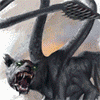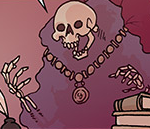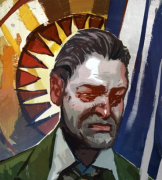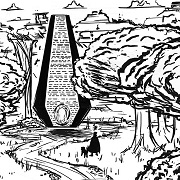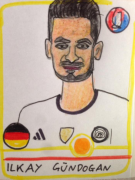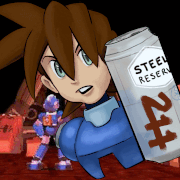|
my 2 cents is that if you're going to be "talking" your way through a puzzle, then it shouldn't matter what your system's rules are, because you're not going to be using the rules anyway
|
|
|
|

|
| # ? May 24, 2024 21:47 |
|
Moriatti posted:I've always been of the mind that, if you are running a dungeon crawl, the players are going to be ok with some level of gamification, and puzzles are fine, but let them skill check out of it for their character to solve it. One of the FFG chuthulu games had a puzzle system where you had to arrange little bits of card into a symbol, and your character's intelligence either gave you some of it presolved, and/or controlled how many moves you had. Anyone remember the exact mechanic and which game it was?
|
|
|
|
is Cortex Prime a released, playable game? I see people talking about every now and then online but I can never find where to buy a copy. I always thought "The Old School Job" in Cortex Plus's Hacker's Guide was a neat concept for a game and wish it was more fleshed out.
|
|
|
|
Angrymog posted:One of the FFG chuthulu games had a puzzle system where you had to arrange little bits of card into a symbol, and your character's intelligence either gave you some of it presolved, and/or controlled how many moves you had. Anyone remember the exact mechanic and which game it was?
|
|
|
|
Angrymog posted:One of the FFG chuthulu games had a puzzle system where you had to arrange little bits of card into a symbol, and your character's intelligence either gave you some of it presolved, and/or controlled how many moves you had. Anyone remember the exact mechanic and which game it was? Probably Mansions of Madness. One of the best parts of the app integration with the 2nd edition was moving all the puzzle stuff to the app instead of physical puzzle pieces. IIRC in the current edition you make an Observation check and number of successes you get is the number of puzzle moves you get for that action (sliding tiles, rotating pieces, moving stacks, etc.) Plus you can burn Clues for bonus moves.
|
|
|
|
gradenko_2000 posted:my 2 cents is that if you're going to be "talking" your way through a puzzle, then it shouldn't matter what your system's rules are, because you're not going to be using the rules anyway
|
|
|
|
Puzzles are poo poo when your character is a hyper-intelligent elf or whatever with 200 years experience but you, the player, is just a regular guy. Or when your character is a moron but you've been doing puzzles like this one since you were six. Don't use puzzles.
|
|
|
|
mkultra419 posted:Probably Mansions of Madness. One of the best parts of the app integration with the 2nd edition was moving all the puzzle stuff to the app instead of physical puzzle pieces. IIRC in the current edition you make an Observation check and number of successes you get is the number of puzzle moves you get for that action (sliding tiles, rotating pieces, moving stacks, etc.) Plus you can burn Clues for bonus moves. You get a number of moves equal to your corresponding stat, no check needed.
|
|
|
|
gonna make a puzzle with the old "only some tiles are safe to step on" gimmick but the thing that tells you which ones is a picross
|
|
|
|
moths posted:Puzzles are poo poo when your character is a hyper-intelligent elf or whatever with 200 years experience but you, the player, is just a regular guy. Yeah, that's basically what I said when I asked the question, but I wondered if any designers had come up with an interesting take. Seems like the answer is "no", although I did appreciate the tips some posters shared.
|
|
|
|
moths posted:Puzzles are poo poo when your character is a hyper-intelligent elf or whatever with 200 years experience but you, the player, is just a regular guy. I mean you could say the same about the tactical side of combat. My character has been fighting monsters since he was 12, obviously he should have a better grasp on the intricacies of bringing down a beholder than I do.
|
|
|
|
Speaking of mental stats not mattering, I've had poo poo DMs rule that however long we the players spent discussing a topic is how long our characters wasted, goodbye initiative, despite none of us having a 20 in Wisdom or Intelligence in real life. Same DM would tell us "It's too late, you just did the thing you casually mentioned, no take backs," despite the characters being in the middle of several hours long downtime and still, to the best of our knowledge, weighing options. We'd also get minutes when our genius Wizard, life of crime and skullduggery Rogue, and formally trained in tactics Fighter had days to come up with a plan. A single player could say "I sneak into the castle to murder the duke" and we'd be dealing with guards before anyone gets a chance to counter with another idea. Somehow this only happened when it hosed us over. Our characters weren't just as smart as us, they were significantly dumber because time compression always worked against them.
|
|
|
|
The combat side of things are already accounted for mechanically, though.
|
|
|
|
My Lovely Horse posted:gonna make a puzzle with the old "only some tiles are safe to step on" gimmick but the thing that tells you which ones is a picross
|
|
|
|
Also, to piggyback on the puzzles should be optional thing: I plan on giving my players an encoded message. I have encoded it through actual pen and paper coding techniques, so it is difficult to crack but is technically crackable. Similarly, there are skill checks plauers may make to increase the chances of cracking it. HOWEVER, cracking it is a bonis, that this character has a coded message they wish to retrieve is the clue. I feel that this sort of optional use is fine.
|
|
|
|
I had a GM whose "puzzles" were actually rounds of some small boardgames. One time he represented trying to make contact with an alien intelligence with Dixit, and used some old Maze boardgame to represent us trying to chase a guy through a dungeon.
|
|
|
|
In my little Strike! adventure, I provided two separate puzzles for the puzzle room and let DMs decide whether they think their group would enjoy a math puzzle or classic riddles. But also, how well you did at puzzle solving just determined how many HP you started the next encounter with. So if you did well, you'd be at full HP, if you got all of them perfectly, you'd get bonus HP, and if you sucked, you'd be bloodied at the start. The whole "my character would be better at this than me" is a red herring. Your character would also be better at figuring out the optimal tactical moves in combat, but you don't sit there and expect the DM to tell you what to do on your turn, and on the flip side you'd be annoyed if your DM stopped you and said "oh, sorry, your INT is too low to make those moves. You have to just charge the biggest enemy instead." Your high INT character would be better than you at coming up with a plan to rob the casino, but you still have to do that, too. When you play Gumshoe, your character's skills get you clues, but you the player have to put them together to solve the mystery. Figuring things out is half the fun of RPGs and to sit there and say "well my character could do all of this, so why am I doing anything" is silly. If you don't like puzzles, that's another complaint entirely. Some people don't like tactical combat. The solution? They shouldn't play games that have tactical combat! Easy. There are plenty of RPGs out there that don't. Similarly, there are tons of RPGs and adventures that don't have puzzles, so there is no need to be down on the ones that do. If you want one without puzzles, play one without puzzles! Some of us really like puzzles. Now a more interesting topic is the best ways to integrate puzzles into RPGs, which was what was initially asked about. Having a puzzle that is hard enough to puzzle the puzzle-geeks just means that regular folk aren't going to have a clue. Two ideas, then: 1. Integrate an easy puzzle with tactical combat so that the problem isn't "can you solve it" but rather "can you spare the actions to solve it while still winning the fight?" 2. Have a puzzle that allows for gradations of success. So like have an optimization puzzle where the optimal solution gives the best reward but where you can still get a really good reward for coming close. I'd like to hear more ideas like this based on the assumption that you want puzzles in the game and you're aiming to please people who like puzzles but have a range of skill levels and abilities, rather than trying to appease people who don't want puzzles at all.
|
|
|
|
Evil Mastermind posted:I had a GM whose "puzzles" were actually rounds of some small boardgames. One time he represented trying to make contact with an alien intelligence with Dixit, and used some old Maze boardgame to represent us trying to chase a guy through a dungeon. This is actually extremely clever! I really like it.
|
|
|
|
I had designed and 3d printed a cryptex with its own runic language as a puzzle for the ultimate dungeon of my D&D game where the players would find hints to the positions of certain 'letters' and then try to brute force it from there or continue searching for clues and I was going to let them straight-up bust it open with a strength check/actually stomping on it IRL if they thought of that as a solution but the group dissolved  . .Is there any simple lightweight drawing program that handles grids well/natively? Basically like graph paper on a screen.
|
|
|
|
Crossposting from C-SPAM: https://twitter.com/JuniperTheory/status/1020104885772210176
|
|
|
|
Father Wendigo posted:Crossposting from C-SPAM: G-d
|
|
|
|
Man, just yesterday I was thinking how bad the MtG storyline stuff was. This definitely wasn't what I had in mind.
|
|
|
|
Jimbozig posted:The whole "my character would be better at this than me" is a red herring. Your character would also be better at figuring out the optimal tactical moves in combat, but you don't sit there and expect the DM to tell you what to do on your turn, and on the flip side you'd be annoyed if your DM stopped you and said "oh, sorry, your INT is too low to make those moves. You have to just charge the biggest enemy instead." Your high INT character would be better than you at coming up with a plan to rob the casino, but you still have to do that, too. When you play Gumshoe, your character's skills get you clues, but you the player have to put them together to solve the mystery. Figuring things out is half the fun of RPGs and to sit there and say "well my character could do all of this, so why am I doing anything" is silly. Isn't that why combat is abstracted so that you don't have to describe your turn all "Ho ha ha dodge parry turn thrust strike!" and instead just say your move and action and roll your dice? I mean, I've seen games where they try to make every little move count and you gotta talk about balestra and attaque au fer and whatever. Wouldn't the equivalent of saying "My guy uses Come and Get It" be "I use whatever tool this game has for abstracting my character smartness into puzzle solving?"
|
|
|
|
theironjef posted:Isn't that why combat is abstracted so that you don't have to describe your turn all "Ho ha ha dodge parry turn thrust strike!" and instead just say your move and action and roll your dice? I mean, I've seen games where they try to make every little move count and you gotta talk about balestra and attaque au fer and whatever. If combat is completely abstracted and any fights are handled with flavored "I attack", qualitatively, that's different, but many RPG games don't do that. Jeffrey of YOSPOS fucked around with this message at 23:02 on Jul 26, 2018 |
|
|
|
Honestly the problem with puzzles in a game is that they are aimed at your players brain. Sure it's conceivable your character could be good at Sudoku or those logic puzzles about what color the guy who brought the blueberry pie to the bake sale's shirt was, but that's not what the puzzle in the game is testing. It's asking "Hey player, do YOU know this" and it might as well be "The sphinx shall not let you pass until you can tell him the name of the alien that replaced Lak Sivrak in the special edition Cantina scene and he shall be very cross if you use your cellphones." Sure the puzzle is dressed up in dungeony trappings, but those two scenarios are basically indistinguishable unless there's a mechanic where the numbers on your character's sheet can fart up the answer as well as the players could.
|
|
|
|
Good combat is fun, and actually matters and has mechanical and narrative impact while a puzzle is just an out of character discussion for an hour with no meaningful results beyond opening a door.
|
|
|
|
Wrestlepig posted:Good combat is fun, and actually matters and has mechanical and narrative impact while a puzzle is just an out of character discussion for an hour with no meaningful results beyond opening a door. Yep the line is pretty easy to define, it's what's fun. Otherwise you can't have a rope use skill. Just have the player say what material rope he's using, the tensile strength of it, and then have him display to the table how to tie off a sheepshank to shorten the slack on the hawser between the two bowlines he did last round.
|
|
|
|
The little tactics game that is played by moving grid miniatures around and choosing powers to use is also aimed at the player's brain. It's valid to design a game around making the players figure stuff out, whether that's your bespoke sudoku variant or dnd grid combat. It's more a matter of making sure that's the sort of game your players want to play. The social part of tabletop gaming pushes people into stretching game systems beyond their intended purpose and rolling with it anyway and that leads to some people playing who hate puzzles of the sort described here and others who are disinterested in elf x-com playing together and complaining about the different things.Wrestlepig posted:Good combat is fun, and actually matters and has mechanical and narrative impact while a puzzle is just an out of character discussion for an hour with no meaningful results beyond opening a door. Jeffrey of YOSPOS fucked around with this message at 23:16 on Jul 26, 2018 |
|
|
|
Jeffrey of YOSPOS posted:The little tactics game that is played by moving grid miniatures around and choosing powers to use is also aimed at the player's brain. It's valid to design a game around making the players figure stuff out, whether that's your bespoke sudoku variant or dnd grid combat. It's more a matter of making sure that's the sort of game your players want to play. The social part of tabletop gaming pushes people into stretching game systems beyond their intended purpose and rolling with it anyway and that leads to some people playing who hate puzzles of the sort described here and others who are disinterested in elf x-com playing together and complaining about the different things. The book comes with the little tactics game, and has mechanical support to help players play the way their hero would. Why doesn't the ranger just shoot whoever? Hunter's Quarry, and fear of opportunity attacks, and cover. The game is designed to show you how to play like your class and includes rewards for doing it. poo poo, Strike! has a whole Role Action for players that can't figure out who they should attack but are aware that maybe their character could figure it out. I think it's called Assess? The puzzle doesn't do any of that because there's no mechanical guidelines. I mean, you could add them, like "Well, your INT bonus is this, so you have 3 of the pairs of this memory challenge complete already" but if you don't do that you're basically saying "Your investment in the stat that would obviously govern puzzles doesn't do anything regarding puzzles. gently caress you, I guess." And yeah, I'm aware that Intelligence should govern fighting capability, but we don't live in that game world when it comes to D&D. Apparently strength is the tactics stat? DTAS in general.
|
|
|
|
Some of you guys are way too into some rules-as-physics stuff. You can design mechanics, encounters, mysteries, and other player-facing elements in a way that makes them fun to engage with for their own sake and also so that you can tie them back into the narrative because it's still a narrative form, with a side goal of making the characters' abilities meaningful. You could also design solely to best represent the characters' abilities, minimize player skill, and maximize immersion. (Uh oh, I'm getting pretty close to using the terms gamist and simulationist.) I want you to realize that neither of those is the only way to design a game! You get to pick what you want your game to do when you design it, and because of the choices you make, you will alienate some segment of gamers who don't like your take. But you have to make those choices or you won't have a game.
|
|
|
|
Out of all the goony rpg conversations I've seen, this is among the gooniest.
|
|
|
|
^^^^ Yo, that's why I'm here. Overthinking elfgames is my thing.theironjef posted:The book comes with the little tactics game, and has mechanical support to help players play the way their hero would. Why doesn't the ranger just shoot whoever? Hunter's Quarry, and fear of opportunity attacks, and cover. The game is designed to show you how to play like your class and includes rewards for doing it. poo poo, Strike! has a whole Role Action for players that can't figure out who they should attack but are aware that maybe their character could figure it out. I think it's called Assess? I think that there are some really poo poo puzzles out there that totally don't tie into the game at all and are also long. Those I will agree are just bad. If I agreed to come play D&D for 2 hours and 60% of that is doing sudoku or picross, that's not what I signed up for. But I also know that you can design puzzles that work with and integrate with the game engine (Portal, for a video games example). Or, I think it's also okay to have puzzles that don't integrate really with the game engine as long as they are not too long. Like, a 5 minute side-thingy seems fun. What do you think about riddles? Puzzles can blur into riddles and I think riddles can play really well in RPGs, working as little mysteries.
|
|
|
|
Puzzles where the GM says "okay I'm going to put A Puzzle here" can easily be bad but situations that invite creative problem solving or challenge the players to understand the fictional world and use that knowledge to accomplish a task are basically puzzles and they own
|
|
|
|
Jimbozig posted:Some of you guys are way too into some rules-as-physics stuff. You can design mechanics, encounters, mysteries, and other player-facing elements in a way that makes them fun to engage with for their own sake and also so that you can tie them back into the narrative because it's still a narrative form, with a side goal of making the characters' abilities meaningful. You could also design solely to best represent the characters' abilities, minimize player skill, and maximize immersion. (Uh oh, I'm getting pretty close to using the terms gamist and simulationist.) I want you to realize that neither of those is the only way to design a game! You get to pick what you want your game to do when you design it, and because of the choices you make, you will alienate some segment of gamers who don't like your take. But you have to make those choices or you won't have a game. My problem with the "This is a game of player skill" design model is that you have to pick a weird place to draw a line. You have to solve these riddles but don't worry, your character knows how to cook. You don't have to know how to ride horses but you need to be familiar with Arthurian-era heraldry. I don't think I'd normally be classified as a Rules as Physics guy. My favorite games are Gamma World 7e and Masks. I'm literally running the only game in Strike! at GenCon this year (that I know of). What I am not is a rules as traps guy. If you tell players they have an INT score and it defines their INT, you need to be thorough with that. Or it's a system mastery trap. The guys who've played this game before will know to dump INT because it doesn't do anything. Jimbozig posted:What do you think about riddles? Puzzles can blur into riddles and I think riddles can play really well in RPGs, working as little mysteries. Basically the same. If there's a game mechanic that could circumvent it and the players want to use that, I'm going to let them. I love riddles and puzzles in general though.
|
|
|
|
cheetah7071 posted:Puzzles where the GM says "okay I'm going to put A Puzzle here" can easily be bad but situations that invite creative problem solving or challenge the players to understand the fictional world and use that knowledge to accomplish a task are basically puzzles and they own This is the good take, it's only the weird context of D&D dungeons that turns puzzles into weird meta-objects. I run Mage which has free-form magic so basically every interaction with the setting is a puzzle in some sense, because I can just throw scenarios at players and let them compose magical solutions and mundane methods to get through.
|
|
|
|
theironjef posted:
Yeah, I know. I made that post and then I looked at the avatars to see who I was replying to and I was like "Oh, I'm an idiot." Anyway, challenge accepted. I'm going to try make a puzzle that integrates with Strike!'s engine and base an adventure or scenario or encounter around it. I'll let you know when I figure it out and we'll see what you think.
|
|
|
|
Actually, I've been working with a houserule to Strike! that I'm going to use at GenCon (I've used it in other games as well) that I'm happy with. I felt like the skill system and the tactical class system felt a little disjointed, and my easy-rear end fix was "Whatever your class is, that's the name of an extra skill you have." Even if it's a reskin, just use the new title. So like the six pregens for my GenCon game have the Hoochslinger (reskinned Wizard), First Mate (reskinned Duelist), Pitcairn Engineer (reskinned Shapeshifter), Burly Bosun (reskinned Martial Artist), Scab Electrician (reskinned Rogue) and Navigator (reskinned Archer) as skills.
|
|
|
|
A puzzle in an RPG should involve using your mechanical abilities in a nonstandard way. Think of it like Legend of Zelda: the puzzles are widely based around movement or special attacks using the tools you've acquired. In 4e, for instance, you could do a puzzle in which the team needs to break five warding crystals at the same time to avoid activating ancient defense golems. The crystals are strategically placed with walls and distance such that they can't simply be AoEd, and if they are forcibly moved they move back on their 'turns'. Instead, someone might put a damage over time effect on one crystal, while a Striker hits another, a fast character runs between two weakened ones, breaking both, and a Controller yanks two closer together so an AoE can break the last two. Something like that. A puzzle divorced from the mechanics and skills the players have been mastering is just a dumb minigame.
|
|
|
|
fool_of_sound posted:A puzzle in an RPG should involve using your mechanical abilities in a nonstandard way. Think of it like Legend of Zelda: the puzzles are widely based around movement or special attacks using the tools you've acquired. In 4e, for instance, you could do a puzzle in which the team needs to break five warding crystals at the same time to avoid activating ancient defense golems. The crystals are strategically placed with walls and distance such that they can't simply be AoEd, and if they are forcibly moved they move back on their 'turns'. Instead, someone might put a damage over time effect on one crystal, while a Striker hits another, a fast character runs between two weakened ones, breaking both, and a Controller yanks two closer together so an AoE can break the last two. Something like that. A puzzle divorced from the mechanics and skills the players have been mastering is just a dumb minigame. Set piece puzzle fights are extremely good and key to making D&D combat fun in general.
|
|
|
|

|
| # ? May 24, 2024 21:47 |
|
theironjef posted:I'm literally running the only game in Strike! at GenCon this year (that I know of). YOu are and it's been full since I bought my ticket and I HATE IT.
|
|
|





